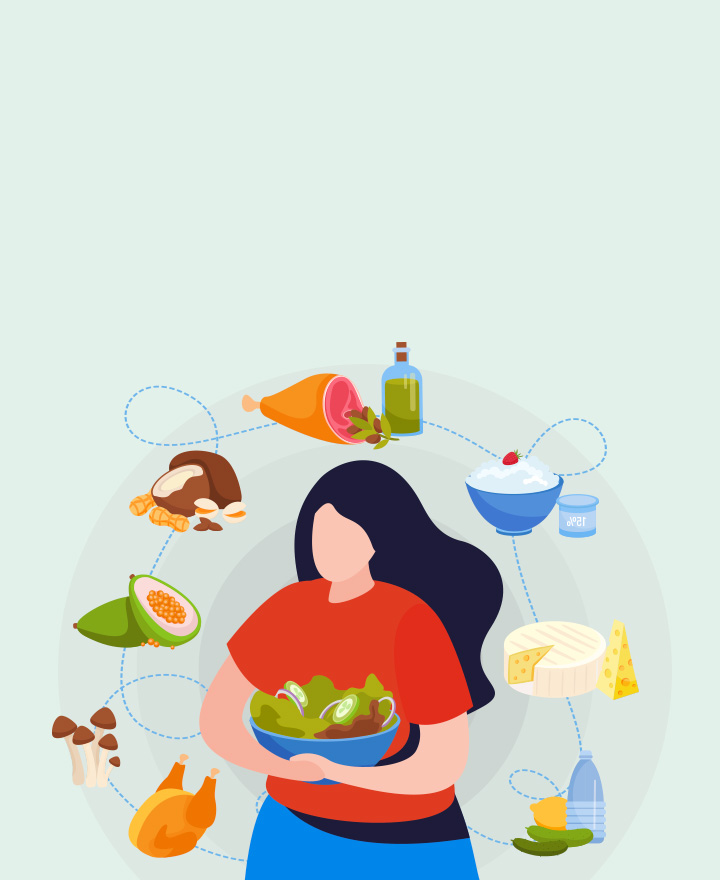

Creating a Balanced Diet with Carbohydrate-Rich Foods
Energy is needed to perform day-to-day activities, and this energy comes from eating carbohydrates, a vital and highly essential nutrient. However, not all types of carbs are good for your body. Read on to know more about the types of carbohydrates and how a healthy meal can be created using foods rich in carbohydrates.
Types of Carbohydrates
• Simple Carbohydrates
Simple carbohydrates are the basic type of carbohydrates. These are refined carbs and they can further be branched into monosaccharides and disaccharides. These can again be branched into subtypes like glucose, fructose, galactose, lactose, maltose, and sucrose, respectively. One example of a simple carb is white, processed sugar, which is found amply in soft drinks, cookies, pastries, candies, etc. Natural sugars like those found in honey, fruits, vegetables, and milk are also simple carbohydrates.
• Complex Carbohydrates
Complex carbohydrates are nutrient-rich and are digested slowly. Sugar molecules clubbed together in long and complex chains make up complex carbohydrates. Starch and fibre come under this category. Some food items rich in complex carbohydrates are legumes, pulses, peas, fruits, vegetables, and whole grains.
How much Carbohydrate is needed?
Before planning to consume foods high in carbohydrates, you must understand the daily requirement in order to stay healthy. Carbs should comprise 45%-65% of your total daily calories. Therefore, if you are consuming 2,000 calories in a day, 900 to 1,300 of those calories should come from carbohydrates. This amounts to nearly 225 g to 335 g of carbohydrates per day. It is best to check the calorie count of any food which contains carbohydrates before including it in your diet.
Creating a Proper Diet Plan
A proper diet plan should include three meals and three snacks, along with healthy beverages like unsweetened green tea or buttermilk and adequate water. When it comes to including carbohydrates in your diet plan, many people are sceptical. This is because, as mentioned earlier, carbohydrates can be both good and bad. In fact, it can be quite tricky to make carbs a part of a healthy diet. Here are some tips that may help you create a proper diet plan with carbohydrate-rich foods:
• Choose complex carbs & avoid simple carbs
Now that you know which type of carbohydrate is better for your body, you will obviously know which one to include most in your diet. In other words, go for complex carbs rather than simple carbs. Avoid added sugar as much as you can. If you’re consuming dairy products, opt for low-fat options.
• Pick diverse carbohydrate-rich foods
Your plate should have different types of foods rich in carbohydrates. If you stick to just one type, you may soon find it boring. Therefore, try to include fresh fruits, vegetables, whole grains, dairy products, legumes, and pulses in small amounts every day.
• Do not overeat
You must keep a tab on how much carbohydrate you are consuming every day. Too much of anything is always detrimental to health. Even with the consumption of complex carbs, you should never overdo it. So, try to pay attention to the portion sizes.
• Make your daily diet well-balanced
By including different types of carbohydrate-rich foods in your daily diet, you can make your diet balanced and healthy.
Here are a few food options to try if you are looking for healthy food high in carbohydrates as part of your daily diet —
• Breakfast
• Oatmeal porridge/masala oats
• Whole grain toast
• Chapatti-sabzi
• Quinoa khichdi
• Dalia porridge/khichdi
• Idli
• Dosa
• Besan or suji cheelas
• Lunch
• Brown rice and mixed vegetable sabzi/chole masala/paneer masala/mixed dal
• Dinner
• Roti/chapatti and mixed vegetable sabzi/rajma masala/chole masala/tadka
• Snacks
• A bowl of mixed nuts
• Boiled stir-fried peas/lentils
• Granola bars
• Fruit salads
You can always tweak this diet suggestion as per your taste and preferences.
Conclusion
So, now you know which carbohydrates to take and which to avoid. In most cases, carbohydrates are mainly derived from foods like beans, peas, lentils, cereals, breads, grains, fruits, and vegetables. The carbohydrates from these sources are complex carbohydrates and best for your health. Consuming healthy carbs and maintaining a healthy lifestyle with less dependence on fast foods can support good health without harming your body in any way.
One of the important components of our overall wellness is also being financially secured. Healthcare emergencies can happen any time, but a good health insurance policy can protect you from such uncertain situations. To know more about Wellness and other health related tips, visit the wellness corner.
Source: okstate.edu, mayoclinic.org, byjus.com, eatthis.com
Disclaimer: This blog provides general information and discussions about health and related subjects. The information and other content provided in this blog, website or in any linked materials are not intended and should not be considered, or used as a substitute for, medical advice, diagnosis or treatment. Kindly contact your Doctor before starting a new medicine or health regime.
Related Articles
The Role of Banana Carbohydrates in a Balanced Diet
20 Foods You Should Eat Every Day for a Longer Life
Ways to Include Protein-Rich Food in Your Diet
Here are 7 Tips to Make Your Favourite Foods Low Carb
Is a low-carb diet helpful for pre-diabetic patients?
Published on August 27, 2024














 Health Insurance
Health Insurance  Travel Insurance
Travel Insurance  Car Insurance
Car Insurance  Cyber Insurance
Cyber Insurance  Critical Illness Insurance
Critical Illness Insurance
 Pet Insurance
Pet Insurance
 Bike/Two Wheeler Insurance
Bike/Two Wheeler Insurance  Home Insurance
Home Insurance  Third Party Vehicle Ins.
Third Party Vehicle Ins.  Tractor Insurance
Tractor Insurance  Goods Carrying Vehicle Ins.
Goods Carrying Vehicle Ins.  Passenger Carrying Vehicle Ins.
Passenger Carrying Vehicle Ins.  Compulsory Personal Accident Insurance
Compulsory Personal Accident Insurance  Travel Insurance
Travel Insurance  Rural
Rural